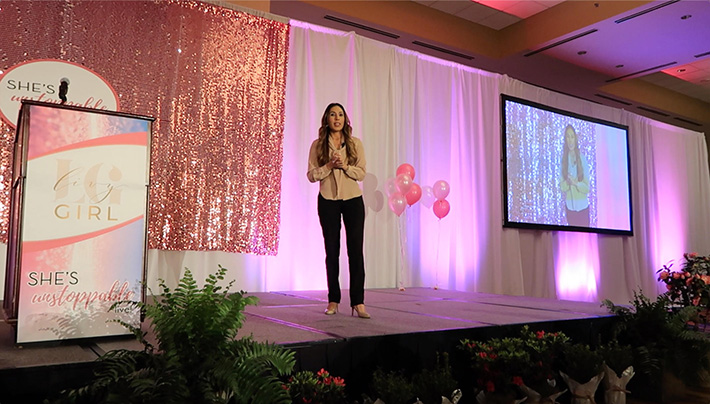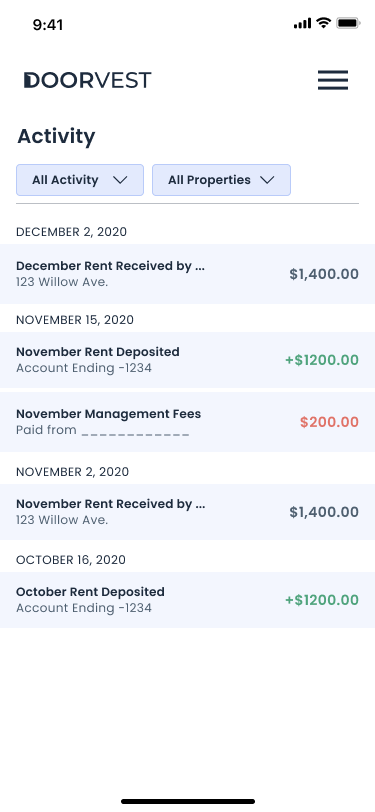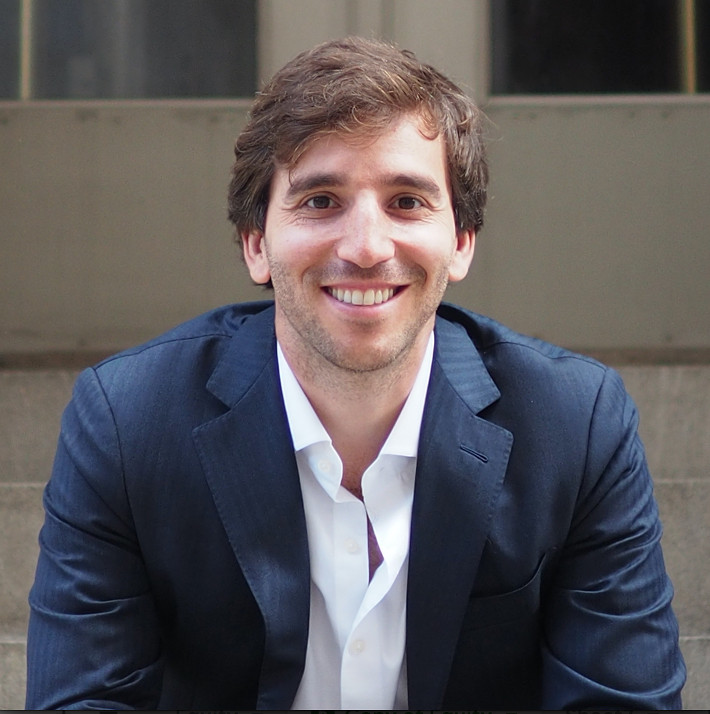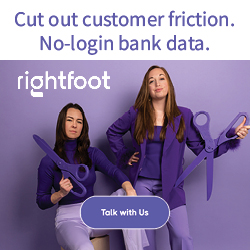Real Estate
Love of Sales Turned Shy Student into LA Real-Estate YouTube Powerhouse
December 18, 2020 “When the Pandemic first started, a lot of the classes we worked with just canceled, everything went downhill,” Loida Velasquez, an LA-based real estate broker, said. “But starting in June until now— everything turned around. Inventory is so low, and there are so many buyers, most houses are selling in 24 hours. I’ve never seen a market like this before.”
“When the Pandemic first started, a lot of the classes we worked with just canceled, everything went downhill,” Loida Velasquez, an LA-based real estate broker, said. “But starting in June until now— everything turned around. Inventory is so low, and there are so many buyers, most houses are selling in 24 hours. I’ve never seen a market like this before.”
It’s a seller’s market like you can’t believe right now, said Velasquez, and that’s what she specializes in: running a cold-calling, door-knocking real estate firm that jumps on expired listings, revamps properties, and sells them on the open market.
After five years of rapid success, Velasquez has taken her charisma to social media, creating a series of Youtube videos to help other brokers find the success she has in the real estate world.
“When I started my real estate career, I remember trying to find videos of people sharing their experience, but most of them were men: I didn’t find many women,” Velasquez said. “So I told myself, ‘you know what, I’m going to start creating videos to put out my journey so people can see what it’s like not only as a real estate agent but as a younger woman in this business.’ And that’s how my channel started.”
Velasquez has also begun teaching online courses for brokers who need help developing their skills. She offers an all-encompassing approach, including cold calling and knocking on doors, that she said many modern brokers don’t use anymore, even though they never became any less viable.
“I knew that the old school approach of cold calling and door knocking was something that a lot of agents don’t like to do,” she said. “So if I became very good at it, I knew that I was going to become successful a little faster than someone who doesn’t incorporate that type of prospecting.”
 It has set her apart, and part of why she launched online classes: her videos on real estate were so successful other agencies were telling their trainees to watch her work. Many agencies don’t offer adequate training, Velasquez said, some give out unethical advice. When newly licensed brokers find Velasquez, she said she stands out as an agent with standards and knowledge of the industry.
It has set her apart, and part of why she launched online classes: her videos on real estate were so successful other agencies were telling their trainees to watch her work. Many agencies don’t offer adequate training, Velasquez said, some give out unethical advice. When newly licensed brokers find Velasquez, she said she stands out as an agent with standards and knowledge of the industry.
That knowledge comes in the form of hard-earned experience, one that includes making slip-ups along the way, something she said ocassionally still happens. It’s all part of the game, she explains. Many of her leads come in from her online networking now, but her techniques are still honed to reach out to sellers looking for a knowledgeable agent who knows the market.
“A lot of my business comes from social media, whether it’s from agents that watch me and send me referrals, or just consumers that are trying to learn what it takes to buy or sell a house,” Velasquez said. “But aside from that, I still cold call a lot of ‘for sale by owners’ and expired. Many of them still want to sell, but they had to pull their home off the market. Many of them didn’t have a good relationship with the last agent and want to find someone else who can do a better job.”
And that relationship comes in the form of Velasquez calling out of the blue, flipping the house successfully in a matter of weeks, sometimes two or three sales every month.
Things were not this easy for what outwardly looks like a charismatic, polished agent; Velasquez attests that she was quiet and anxious even to present a school project before she found her love of sales.
“I was the shyest person ever, and I was terrified of talking in group projects,” Velasquez said. “If people from my past saw me, they would never guess I would be doing public speaking events and would have never known this is what I would become.”
Velasquez was a sociology major before getting a side job as a brand ambassador, traveling to conventions and selling face to face to customers. Everything changed.
“Telling people about the product, getting paid to talk to people, helped me get myself out of my shell and comfort zone,” She said. “I don’t know why I was scared of talking to strangers, but it helped me get out there, and I switched my major to marketing.”
After she went back to get an MBA in 2015, she started making Youtube videos and found her passion. She said that with determination, anyone could get over hurdles and find success. Selling real estate is not what it looks like on TV, but Velasquez noted the hard work is worth it for the payoff.
“After the turning point, I started to see people responding ‘because of this video, I got my first listing.’ I said, if I need to get myself out of my comfort zone to help people, this is something I know I need to do,” Velasquez said. “If you stay focused and surround yourself with the right people, you’ll make it. There will be many times you will doubt yourself, and it is not like what you see on TV.”
How Start-Up Founder Andrew Luong Went From House Flipper to Real Estate CEO
November 19, 2020 Andrew Luong said it all started seven years ago in San Francisco, just out of graduate school investing in real estate with his spare time on the weekends. Today, his startup Doorvest manages more than $20 million in real estate assets.
Andrew Luong said it all started seven years ago in San Francisco, just out of graduate school investing in real estate with his spare time on the weekends. Today, his startup Doorvest manages more than $20 million in real estate assets.
“I wanted to look for an avenue to put the money that I had earned from my day job to work,” Luong said. “The goal was to seek out some income security, build a long-term nest egg, hopefully, some passive income to support my life.”
That avenue turned out to be real estate. Luong thinks more people should have the option to invest in the estimated $3 trillion single-family renting market, now more than ever.
A second wave of infections is sweeping across the nation, and with shutdowns looming and business growth on hold, many face a familiar question:
What can I do to make more money?
Luong believes Doorvest has an answer. The firm offers what Luong calls a Democratized way to invest in real estate, entirely online.
Customers can invest up to $100,000 on the platform. Luong and his team of real estate flipping specialists buy, refurbish, and then rent properties, paying back the rent revenue to investors. Luong said Doorvest only gets paid when the properties are profitable, and the reported average annual return on investment is 18%.
The idea came about when Luong and co-founder Justin Kasad tried to find a better way to invest.
Like his peers back in San Francisco, Luong had tried his hand trading stocks. Many of his friends had Robinhood or high yield savings accounts, and were even trading cryptocurrency- but none of those options were what they were looking for. Real estate felt like that next step, but there was a large process to go from cash investment to payday:
 “From identifying a mortgage to underwriting, looking through offers, ultimately an offer that sticks, then you’re figuring out how to find a mortgage financing, how to get homeowner insurance,” Luong said. “Then you’re closing on this thing, take the title, and you’re figuring out how to lease it out, how to manage your residents, and then ultimately, maintenance and bookkeeping.”
“From identifying a mortgage to underwriting, looking through offers, ultimately an offer that sticks, then you’re figuring out how to find a mortgage financing, how to get homeowner insurance,” Luong said. “Then you’re closing on this thing, take the title, and you’re figuring out how to lease it out, how to manage your residents, and then ultimately, maintenance and bookkeeping.”
With a long, dizzying list of steps, all with uncertain outcomes, it is no wonder a lot of people are put off by that risk, Luong said.
“When my good friend and co-founder Justin and I went through that long list of items, it dawned upon us that if we could deconstruct real estate investing and rebuild it in an online frictionless way, we could bring it to the masses,” Luong said. “We see real estate as a vehicle to funnel people toward financial security.”
The pair got a group of experienced real estate investors and partnered with mortgage providers and renovators to build a platform to handle all of the steps it takes to turn cash into rent income returns. Doorvest will run every step of the process, including property management, while updating investors at every step of the way.
The firm currently focuses on the Houston rental market, Luong’s long term bread-and-butter area, but plans on renting in other markets in the future.
The platform has been in the works for years, but finally launched last year and immediately had to deal with the pandemic, but Luong said Doorvest made it through so far with success.
“It was definitely an experience, back in mid-march Justin and I were like crap, I think we’re done,” Luong said. “Public equities markets were tanking; we’re a young company without a lot of cash. I think people saw the volatility of the public equities market. In that span of two weeks it went down 40% or so and I think that led a retreat towards perceived reliable asset classes.”
To some, investing in Doorvest was perceived as more reliable than a tanking stock market, and after initial fluctuation, the firm is on the up. In his experience, Luong said the real estate market would continue to push toward suburban areas outside of major city centers as the pandemic continues.
All the while, everything is moving digital. As the company evolves, Luong is excited to offer new products to customers, using real estate as a vehicle to build a banking platform or mortgage platform to service a growing smorgasbord of online real estate options.
“We as a company made a bet three to five years out: we believe that real estate will be transacted entirely online,” Luong said. “Historically, you’d show up at a house, walk around, etc. Due to COVID, people weren’t going out, weren’t shaking hands: The adoption of technology to look at a home entirely online just became a lot more natural. Because of that, we’ve had really strong customer demand and fundraising.”
What’s The Future For Commercial Real Estate? An Expert Weighs In
April 1, 2020 Jonathan Wasserstrum is the Founder & CEO of SquareFoot
Jonathan Wasserstrum is the Founder & CEO of SquareFoot
Over recent weeks, all of us have had some adjusting to do with their work setups. Office spaces suddenly, seemingly overnight, became unsafe places to be, in the wake of a global pandemic. For some workers, this shift to work-from-home operations was a win. And companies that had made similar moves away from traditional office spaces looked on and said, “What were you waiting for?” I witnessed all of this chatter happening over the past month, in the shadows of an ongoing health scare that terrifies us all. However, I believe that the noise around office spaces going away is misguided and shortsighted. The truth of the matter is this: Commercial office building landlords, on the other side of this scare, will have to grapple with putting back together the pieces, and will definitely be rethinking how and who they lease to. Yet, this will not be the end of the industry as we’ve known it. Here’s why:
I’ve tried my best, as the owner of a growing business, to keep everything together for myself, my team, my clients, my investors, and more. We’ve done a good job at it, too. But if I’m being honest, not everything is perfect. Far from all is the same. And I have a new set of concerns that have emerged over the couple of weeks we’ve been working remote. It’s impossible, even for the most valiant and virtuous teams, to replicate the same successes they have seen in the past. Well-intentioned workers are producing less. The uncertainty of the economic climate contributes a mitigating factor. New business isn’t walking in the front door the way that it was not long ago. While this experiment began with enthusiasm for many getting to work in their pajamas and to play with their dog during the day, the conversation has quickly turned into a growing collective desire to get back to the way things were. As a result, a reliable office space separate from your home has become arguably more desirable than ever.
At the same time, we must pause to recognize that this prolonged period of working remotely has fundamentally shifted the cultural conversation around flexibility with work. My prediction therefore is that the truth will land somewhere in the middle. People at all companies may not return to work in the office five days a week, and they may not return to the same 9-to-5 schedule they had grown accustomed to, and they might not have a permanent, dedicated seat at the office in accordance with this shift, but those are growing pains that they and their managers can work through. We anticipate that things won’t immediately go back to the way they were, with employees gaining more leverage and applying more pressure than before in discussions with their company executives about giving them a more ideal process and procedure to succeed in all elements of their lives. If there’s one area of improvement that we’ve seen here in the U.S., it’s more families having dinner together on a nightly basis as a unit, with both satisfied parents home and removed from distractions. This luxury is not something people will want to lose any time soon. For their own sake, and for the sake of their families.
With more people pushing for flexibility within office policies, you’ll begin to see more company owners encouraging landlords to meet them where they are in their thinking. Already, the coworking companies had led a sizable shift in how landlords think about dividing up their spaces, and how many employees can be squeezed into one area. The next stage of this industry’s development may look something like this: It’s been rumored for many decades, but perhaps now we’ll see a rise in alternative seating patterns within offices that depend on hot-desking or hoteling to supply the ‘right’ number of seats and amount of space better-suited to the everyday needs of the company. As a business owner myself, I can say that empty seats that I know we’re paying for with every monthly rent payment can be an eyesore. You’ll rarely have a perfect count on any given day, but I know that for startups that are budget-conscious they would prefer to have one or two staffers sitting in an overflow area – on a couch or a barstool – than to have several empty desks on a regular basis. Companies must grow deliberately and thoughtfully in all aspects of their planning, and it’s about time that we take office space needs seriously in the same vein. It’s not as simple as giving 50 seats. Perhaps a company might be better off with 30 seats for its 50 employees in that given office? We see a rise in those types of conversations coming, stemming from an informal campaign from more employees seeking a more friendly work-from-home situation. The companies that offer this kind of and larger levels of flexibility could wind up being known as the more competitive places to work, especially for the category of veteran employees who have large families to think about and care for. Taking some responsibility for and giving genuine care for employee welfare is a mounting concern for many company founders.
This emphasis on flexibility will go one step further, though. Founders have never really wanted to be tied down by a long-term office lease; it was always deemed a necessity. Some landlords were already beginning to think along these lines, especially in the wake of what coworking companies have built on top of their real estate. We see that trend accelerating in 2020 and going forward. Over recent weeks, at SquareFoot, the company I own and lead, we’ve heard from more landlords than we had been working with in the past about how we can help put the right companies into their spaces, quickly. Over the past year, we’ve been leading this conversation, championing the virtues and values of flexibility for people in need first of a comfortable lease ahead of all other factors (neighborhood, view, commute, and more). We have two flexible office solutions we offer: PivotDesk, which is like airbnb for office space and pairs a host with a guest to share a space, and FLEX, which gives people the chance to get the office space they want with the lease they want. Both of these options require us to have good standing and good working relationships with landlords, but all of these variations and deviations from the norm of the traditional real estate world require first for the landlords to step up and say they recognize that the times have changed. The conversation has already changed.





























